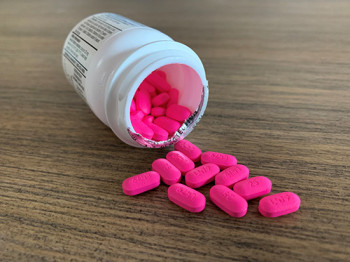DMSO With Levothyroxine Interaction
In our latest question and answer, the pharmacist discusses the potential interaction between levothyroxine and DMSO (Dimethylsulfoxide).

Question
I take Synthroid for hypothyroidism, and I have seen studies suggesting that DMSO may help treat or even cure autoimmune disorders. What do you think? Can I take it? Thank you.

Answered by Dr. Brian Staiger, PharmD
Medical Content Reviewed By HelloPharmacist
Staff
Last updated Jun 30, 2025
Answer
Thanks so much for your question! We appreciate you reaching out.
I’ll start by addressing any potential interaction between DMSO (dimethyl sulfoxide) and your current medication, levothyroxine (Synthroid).
While there are no well-documented drug interactions between DMSO and levothyroxine, I do not recommend using them together.
DMSO is a powerful chemical solvent. That means it can dissolve and carry many substances, including medications, through the skin and into the bloodstream. It also interacts with important biological molecules like proteins, fats, and sugars.
Because of this, DMSO could potentially affect how levothyroxine is absorbed or processed in the body. Levothyroxine is extremely sensitive to changes in absorption, and it is dosed in micrograms remember, which is one thousandth of a milligram. Even small changes in timing or dose can have a significant impact on how well your thyroid condition is managed. The first time you started on levothyroxine, your pharmacist probably discussed how to take it effectively with regard to other medications and food intake.
If you are going to take DMSO as a dietary supplement, I strongly recommend separating it from your levothyroxine dose by several hours. This may reduce the risk of interaction, though we cannot say for sure whether it is still fully safe or effective without proper data.
Additional Thoughts on DMSO
DMSO is only approved by the FDA for one medical use in humans, treating interstitial cystitis. In that case, it is administered directly into the bladder under medical supervision. Beyond this, DMSO is not approved for oral or topical use.
Here at HelloPharmacist, we obviously focus heavily on natural and alternative medicine, so we are very aware that DMSO has become a popular remedy. It is often promoted for helping to treat everything from arthritis and inflammation to autoimmune disorders, infections, and even cancer.
This interest is based on its wide range of biological effects for DMSO. Studies certainly do support that DMSO may help block nerve pain, reduce inflammation, act as an antioxidant, and improve blood flow by reducing clotting and relaxing blood vessels. Some lab studies even suggest it might help other drugs reach the brain or preserve cells during freezing and storage.
That said, actual research in people for the treatment of specific conditions is very limited. DMSO may help with specific conditions like complex regional pain syndrome or skin injuries caused by chemotherapy drugs, but for most other conditions, including rheumatoid arthritis, osteoarthritis, amyloidosis, peptic ulcers, and wound healing, the studies are too small or poorly controlled.
There are also real safety concerns. There is a reason why online sellers typically do not label DMSO as a dietary supplement. Oral use has not been adequately studied in humans. In addition, although pharmaceutical grade DMSO is produced, none is formulated or approved for oral use. Most products sold online are intended for lab use and may contain harmful impurities.
Topical use of DMSO in low concentrations for symptoms of pain, is likely far safer than oral use, but again, there is limited data.
Final Words
If you are thinking about taking DMSO as a supplement, do not take it together with your levothyroxine. Most importantly, talk with your doctor before starting it, so you can be properly monitored and make sure it is safe for your specific health situation.
-
 Dr. Brian Staiger, PharmD
Dr. Brian Staiger, PharmD
- 287 views


